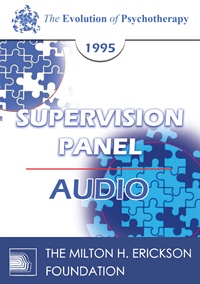
- Average Rating:
- Not yet rated
- Topic Areas:
- Supervision Panels | Supervision | Psychotherapy
- Categories:
- Evolution of Psychotherapy | Evolution of Psychotherapy 1995
- Faculty:
- Stella Chess, MD | Eugene Gendlin, PhD | Jay Haley, MA
- Course Levels:
- Master Degree or Higher in Health-Related Field
- Duration:
- 1:00:02
- Format:
- Audio Only
- Original Program Date:
- Dec 15, 1995
- Short Description:
- Supervision Panel 3 from the Evolution of Psychotherapy 1995 - Chess, Gendlin and Haley Educational Objective: To compare and contrast clinical and philosophical perspectives of experts.
- Price:
- $15.00 - Base Price
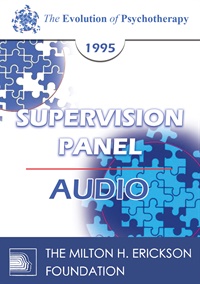
- Average Rating:
- Not yet rated
- Topic Areas:
- Supervision Panels | Supervision | Psychotherapy
- Categories:
- Evolution of Psychotherapy | Evolution of Psychotherapy 1995
- Faculty:
- Mary Goulding, MSW | Judd Marmor | Olga Silverstein, MSW
- Duration:
- 54 Minutes
- Format:
- Audio Only
- Original Program Date:
- Dec 15, 1995
- Short Description:
- Supervision Panel 4 from the Evolution of Psychotherapy 1995 - Goulding, Marmor and Silverstein Educational Objectives: To compare and contrast clinical and philosophical perspectives of experts.
- Price:
- $15.00 - Base Price
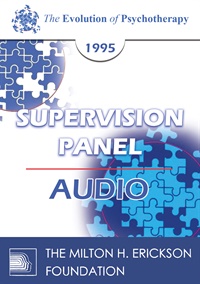
- Average Rating:
- Not yet rated
- Topic Areas:
- Supervision Panels | Supervision | Psychotherapy
- Categories:
- Evolution of Psychotherapy | Evolution of Psychotherapy 1995
- Faculty:
- Aaron Beck, MD | Otto Kernberg, MD | Jeffrey Zeig, PhD
- Course Levels:
- Master Degree or Higher in Health-Related Field
- Duration:
- 55:31
- Format:
- Audio Only
- Original Program Date:
- Dec 15, 1995
- Short Description:
- Supervision Panel 5 from the Evolution of Psychotherapy 1995 - Beck, Kernberg and Zeig Educational Objective: To compare and contrast clinical and philosophical perspectives of experts.
- Price:
- $15.00 - Base Price
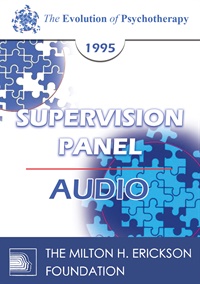
- Average Rating:
- Not yet rated
- Topic Areas:
- Supervision Panels | Supervision | Psychotherapy
- Categories:
- Evolution of Psychotherapy | Evolution of Psychotherapy 1995
- Faculty:
- Arnold Lazarus, Ph.D. | Miriam Polster | Margaret Singer, PhD
- Duration:
- 58 Minutes
- Format:
- Audio Only
- Original Program Date:
- Dec 15, 1995
- Short Description:
- A panel of experts discuss their viewpoints on the given topic.
- Price:
- $15.00 - Base Price
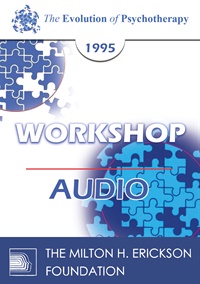
- Average Rating:
- Not yet rated
- Topic Areas:
- Workshops | Psychology | Hypnotherapy | Psychotherapy | Therapeutic Relationship
- Categories:
- Evolution of Psychotherapy | Evolution of Psychotherapy 1995
- Faculty:
- Ernest Rossi, PhD
- Duration:
- 2:49:24
- Format:
- Audio Only
- Original Program Date:
- Dec 13, 1995
- Short Description:
- The Basic Accessing Question is a simple fail-safe approach to accessing inner resources and creative problem solving by the patient with a minimum of suggestion by the therapist.
- Price:
- $15.00 - Base Price
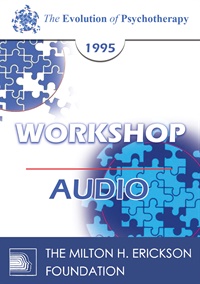
- Average Rating:
- Not yet rated
- Topic Areas:
- Workshops | Anxiety | Psychotherapy
- Categories:
- Evolution of Psychotherapy | Evolution of Psychotherapy 1995
- Faculty:
- Joseph Wolpe, M.D.
- Duration:
- 2 Hours 28 Minutes
- Format:
- Audio Only
- Original Program Date:
- Dec 13, 1995
- Short Description:
- Seminal laboratory experiments show how habits are unlearned. Behavioral analysis: Accurately identify fear eliciting stimulus patterns. Description of major techniques with case examples, e.g., systematic desensitization, flooding, assertiveness training. Practica involving attendees showing treatment of specific anxiety constellations will reveal how the therapist adjusts to the individual.
- Price:
- $15.00 - Base Price
Tags: Anxiety Joseph Wolpe Psychotherapy
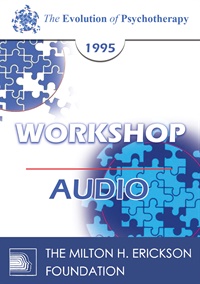
- Average Rating:
- Not yet rated
- Topic Areas:
- Workshops | Psychotherapy | Therapist Development
- Categories:
- Evolution of Psychotherapy | Evolution of Psychotherapy 1995
- Faculty:
- Arnold Lazarus, Ph.D.
- Duration:
- 2 Hours 34 Minutes
- Format:
- Audio Only
- Original Program Date:
- Dec 13, 1995
- Short Description:
- A consistent, testable theory can permit the importation of effective techniques, not theories, on patients. Knowing when to apply a specific technique and how to enhance compliance will be stressed.
- Price:
- $15.00 - Base Price
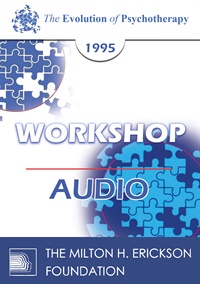
- Average Rating:
- Not yet rated
- Topic Areas:
- Workshops | Reality Therapy | Psychotherapy
- Categories:
- Evolution of Psychotherapy | Evolution of Psychotherapy 1995
- Faculty:
- William Glasser, MD
- Duration:
- 2:38:34
- Format:
- Audio Only
- Original Program Date:
- Dec 13, 1995
- Short Description:
- This workshop focuses on the control theory and how it relates to the practice of Reality Therapy. Demonstration with volunteers from the audience who will role-play actual clients they are now working with will be highlighted.
- Price:
- $15.00 - Base Price
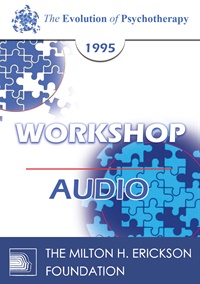
- Average Rating:
- Not yet rated
- Topic Areas:
- Workshops | Redecision Therapy | Memory | Psychotherapy
- Categories:
- Evolution of Psychotherapy | Evolution of Psychotherapy 1995
- Faculty:
- Mary Goulding, MSW
- Duration:
- 1 Hour 29 Minutes
- Format:
- Audio Only
- Original Program Date:
- Dec 13, 1995
- Short Description:
- Memories may be treated as one-act dramas, dialogues or dreams, as volunteers use them, incorporate them in new ways and let them return to the past. Demonstration, with audience volunteers, of a single childhood memory to make changes in their current lives will illustrate Redecision Therapy.
- Price:
- $15.00 - Base Price
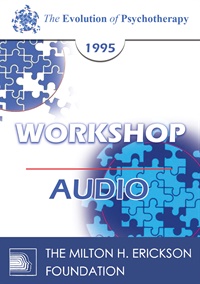
- Average Rating:
- Not yet rated
- Topic Areas:
- Workshops | Psychotherapy | Therapist Development
- Categories:
- Evolution of Psychotherapy | Evolution of Psychotherapy 1995
- Faculty:
- James F. Masterson, MD
- Duration:
- 2 Hours 35 Minutes
- Format:
- Audio Only
- Original Program Date:
- Dec 13, 1995
- Short Description:
- The development of the capacities of the healthy real self is described along with the impairments in these capacities that ensue in the Disorders of the Self. A diagnostic system based on the Disorders of the Self is presented, its conceptual basis is explained, and it is compared with DSM IV. A central triadic psychodynamic theme of these disorders, i.e., self-activation leads to depression which leads to defense, is described.
- Price:
- $15.00 - Base Price
Please wait ...

